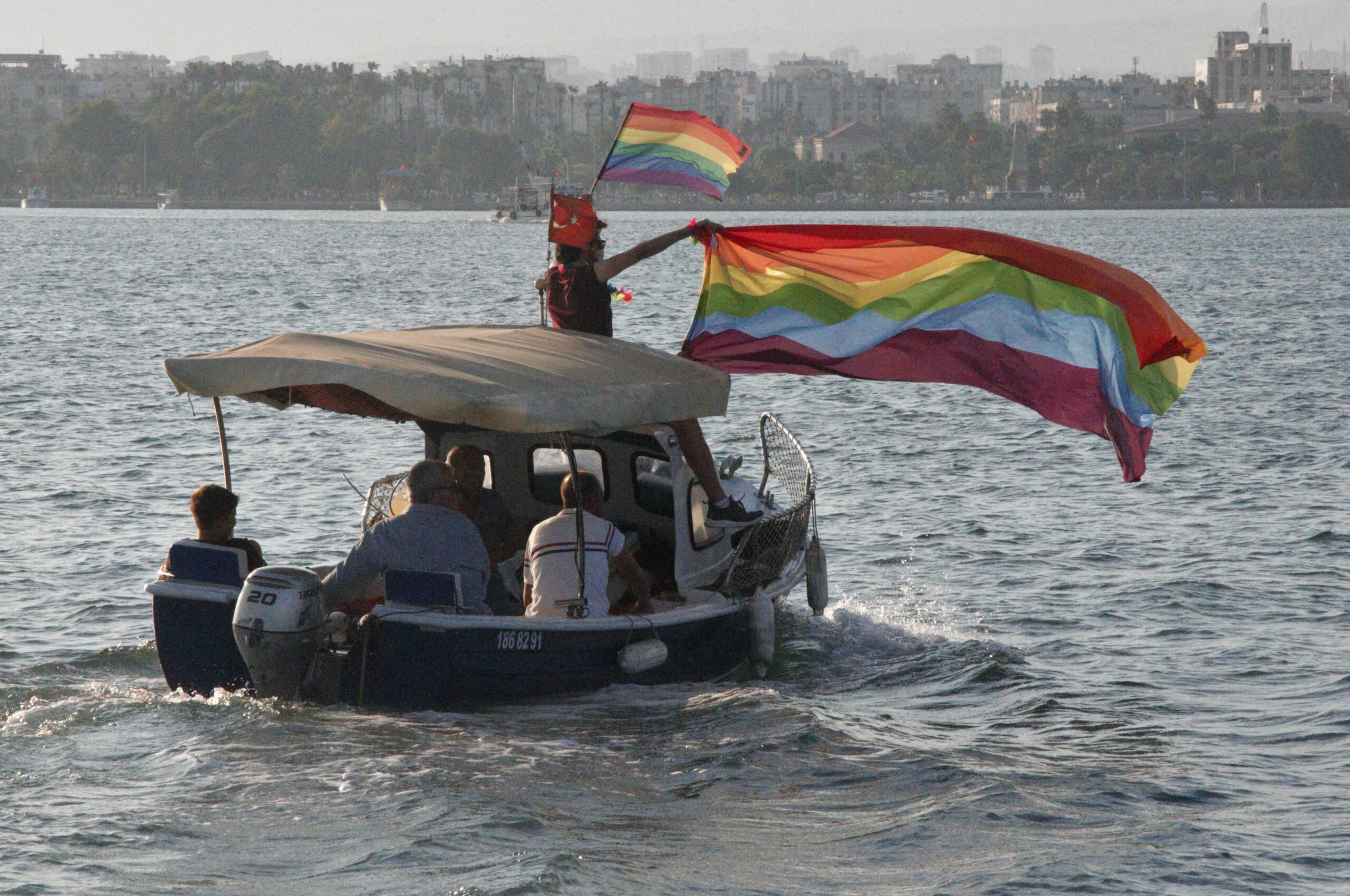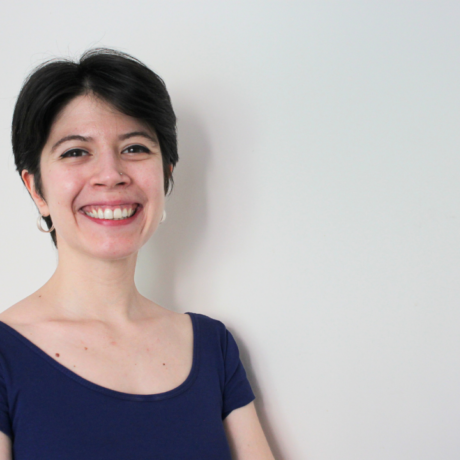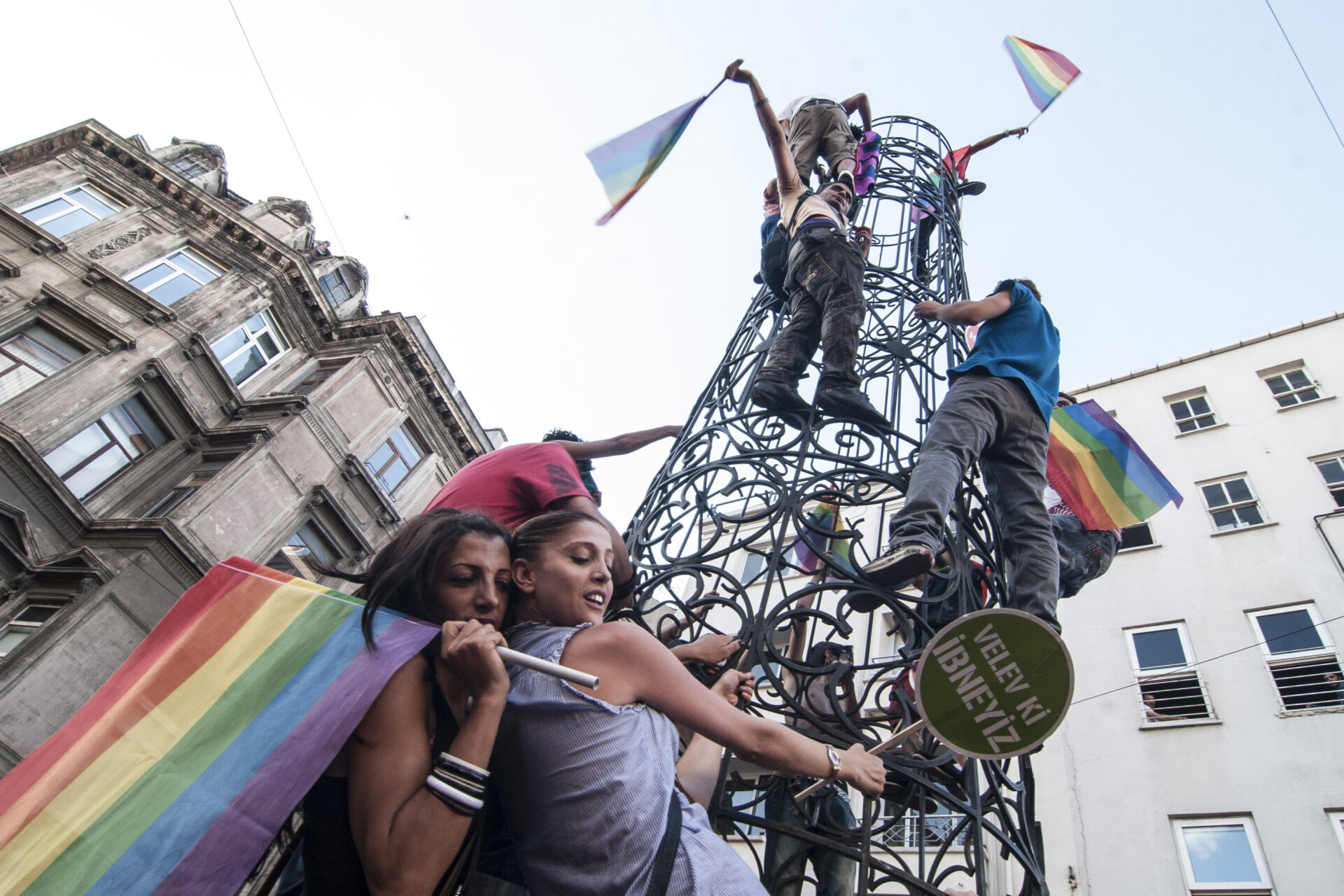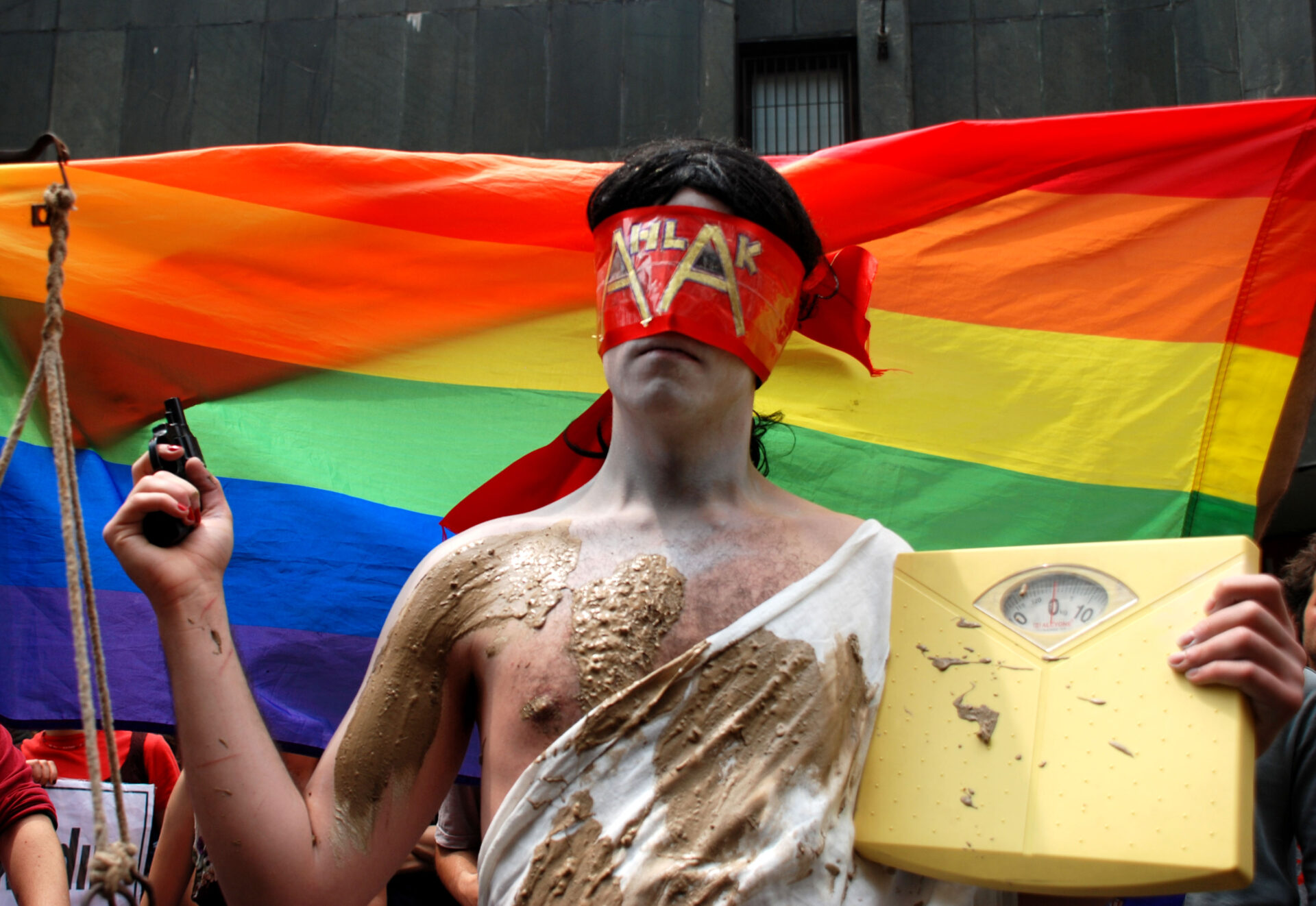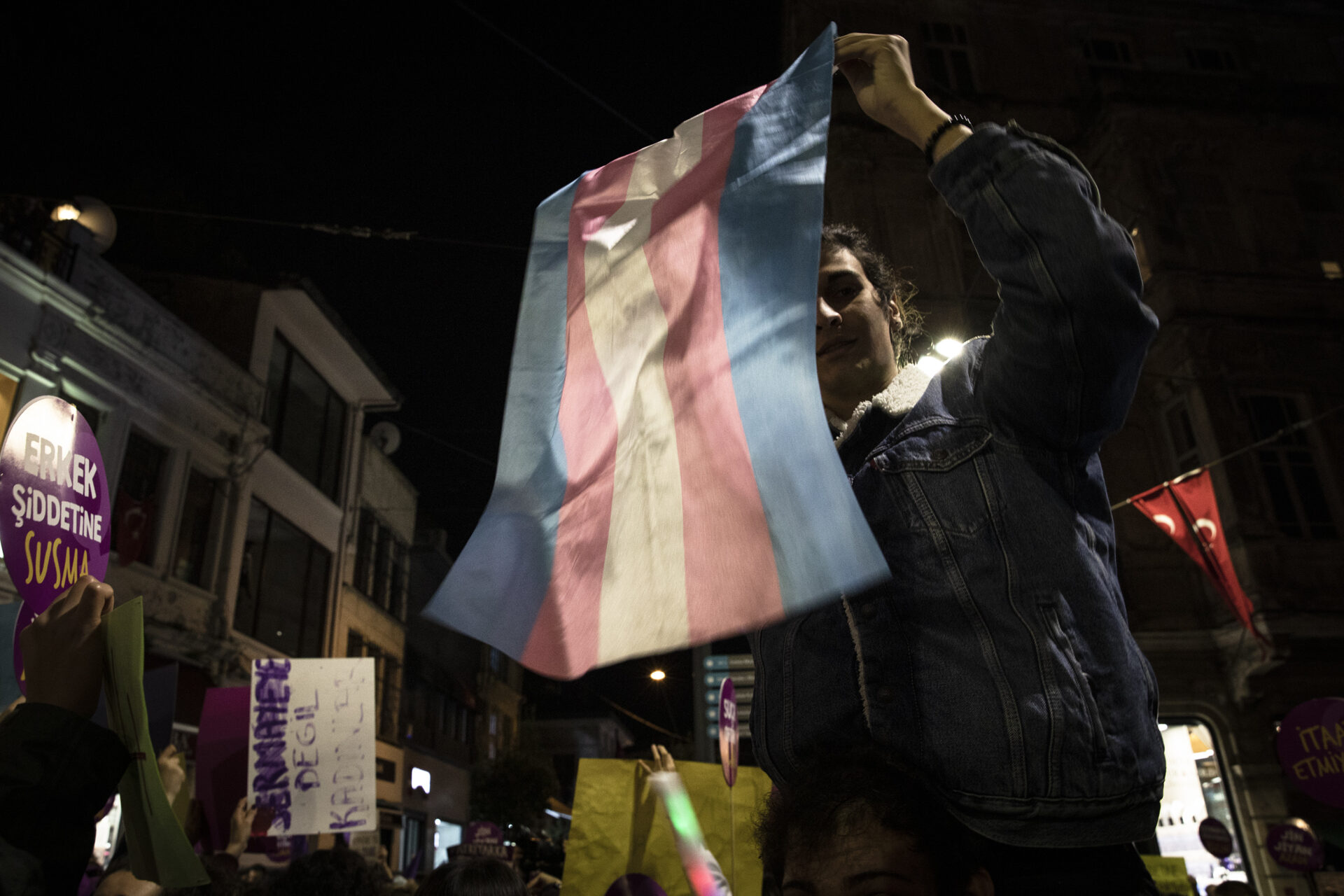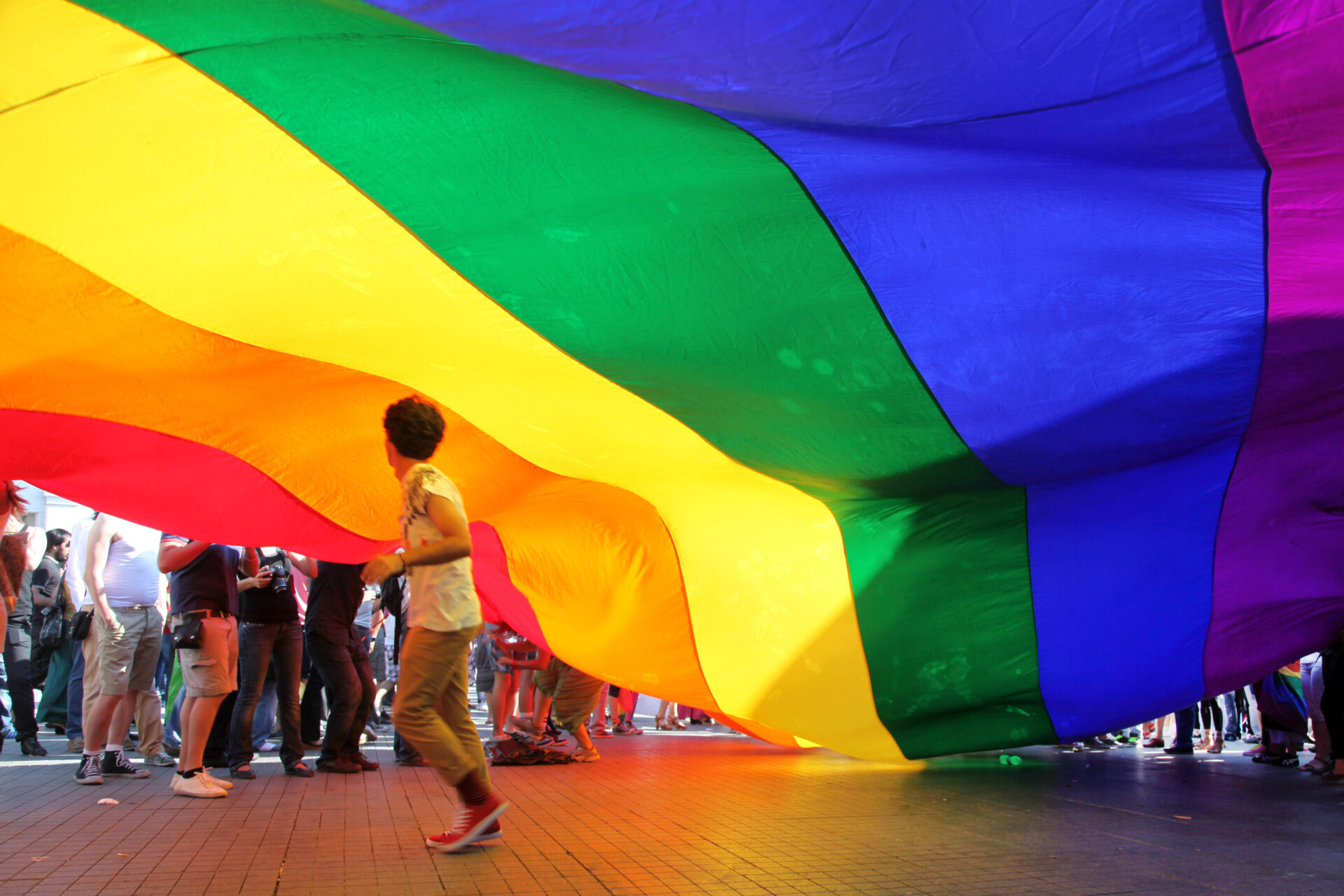On a blazing June afternoon in 2014, Istanbul’s Istiklal Avenue shimmered with colour and echoed drumbeats. A rainbow flag stretched for metres, cascading above a crowd of tens of thousands.
It was one of the largest Pride Marches Türkiye had ever seen, a celebration of existence that was unapologetic and defiantly alive. Over 90,000 people flooded Istanbul’s Beyoğlu district, not an ordinary avenue, but one of the country’s most symbolically charged public spheres. On that day, it carried the voices of those reclaiming equal rights for everyone, without exception. That would be the last Istanbul Pride March to take place without police violence.
2015, just a year later, marked a turning point: The beginning of a new era of repression for LGBTIQ+ rights. On the day of Pride March, participants once again gathered on Istiklal Avenue. But this time the event banned, and riot police moved in with water cannons, tear gas, and rubber bullets.
While the years before were far from ideal, from that point forward, repression became policy. Almost every attempt to gather was met with violence. And yet, Türkiye’s LGBTIQ+ community, long accustomed to reclaiming rights and space in adversity, persisted. Organisers devised creative tactics: Surprise press statements, flash marches, coded gathering points.
Despite the challenges, we believe in the power of solidarity. The barriers we encounter in our fieldwork are teaching us how to fight in more creative, resilient, and organised ways.Muamma LGBTI+ – NHC Partner in Türkiye
A worldwide trend, a sharp local echo
What has happened in Türkiye mirrors a broader global reality. Across continents, equal rights are under growing attack. This backlash is not spontaneous. It is fuelled by a rising anti-gender ideology and populist leaders that frame gender equality and sexual rights as existential threats. These attempts to roll back hard-won gains often operate under the banner of protecting ‘the family’, ‘tradition’, or ‘children’.
Türkiye is not an outlier in this trend, but it is a clear example of how state mechanisms can be mobilised to systematically target LGBTIQ+ communities. Over the past year alone, Turkish authorities have banned almost all public gatherings – even private events – censored art and festivals, detained countless activists, and poured public funds into anti-LGBTIQ+ propaganda. And yet, despite relentless targeting, the LGBTIQ+ movement in Türkiye continues to resist. Their struggle is not isolated, it is part of a global frontline for equality.
From discourse to policy
In prominent speeches, leading government officials and political figures have repeatedly labelled LGBTIQ+ people as a ‘global desexualisation project’, ‘deviants’, ‘plague’, ‘harmful trends’, and ‘the enemy of the family and the nation.
Such rhetoric has been echoed in policy shifts, such as the Ministry of Family and Social Services’ Vision Document, which directly linked LGBTIQ+ existence with ‘harmful trends’ threatening traditional family structures. Simultaneously, 2025 was declared ‘the Year of the Family’, and the national budget allocated 16 billion liras to support this agenda, branding it as ‘family protection.’
This thread has been further reinforced by a leaked government draft law proposal and a bill submitted by HÜDA PAR aiming to criminalise gender and sexual diversity and restrict LGBTIQ+ visibility. These proposals would entrench discrimination and violate Türkiye’s obligations to uphold the rights to equality and non-discrimination. Most recently, the Ministry of Family and Social Services instructed its units to avoid using terms such as ‘gender’, ‘gender identity’, and ‘sexual orientation’ in all engagements – explicitly calling for Türkiye’s opposition to these concepts to be reflected on the global stage. These efforts are mirrored in actions by various public bodies: The state broadcasting authority promoted anti-LGBTIQ+ marches as public service while censoring queer representation, and some medical faculties have stripped graduation oaths of references to equality.
‘Increasing hostile political discourse and legal backsliding on LGBTI+ rights, both in Türkiye and globally, have deeply impacted the daily lives of the community. The normalisation of hate speech and rising discrimination are pushing many into invisibility, causing psychological distress, and creating serious barriers to accessing basic rights.’ Muamma LGBTI+
Beyond these policies, LGBTIQ+ people in Türkiye face widespread and systemic exclusion across nearly every area of life – including healthcare, housing, education, legal protection, employment, and the rights to peaceful assembly and association. These issues are compounded by rising hate crimes and targeted violence, often met with impunity.
None of these are isolated. They are systemic, structural, and they are allowed to continue in a climate of impunity.
Türkiye’s LGBTIQ+ community united and unyielding
However, LGBTIQ+ movement across Türkiye are not standing back, they are actively challenging the tide of repression. In the face of hostility, they are weaving webs of solidarity, pursuing collective advocacy, and creating safe spaces. Together, they are reshaping the dominant narrative and dismantling exclusion.
‘Advocacy efforts are heavily restricted, Pride Marches are banned, our social media is censored, and vague accusations like ‘public indecency’ are used to silence us. Yet, despite it all, we’re organising the 11th Mersin Pride Week this year. LGBTI+ people in Mersin continue to come together.’ Muamma LGBTI+
One such effort comes from our partner Muamma LGBTI+ Association in Mersin, despite relentless barriers to operating legally and an atmosphere of intimidation. In Türkiye, the legal and medical processes of gender transition are fragmented, inconsistent, and often lacking in dignity. Trans+ people face systemic discrimination at nearly every step, from access to healthcare to courtroom procedures. In this context, by fostering a nationwide peer counsellors’ network for trans+, the team builds a community-rooted model of care. They support, inform, and advocate from within.
‘Our peer counselling service offers an alternative support system that counters the discrimination trans+ face. Peers with shared experiences provide emotional support, guidance, and information, forming a safe network. This model helps meet needs collectively, especially where access to professional services is limited. Our fieldwork has become both more difficult and more crucial due to this rising hate speech and political pressure. Demand for our psychosocial support is growing, but lack of resources remain a major challenge.’ Muamma LGBTI+
Our partner Özgür Renkler is breaking down institutional barriers as well. In Bursa, they are expanding access to essential social services for LGBTIQ+ communities too often excluded by systemic discrimination and institutional barriers. As the only rights-based LGBTIQ+ organisation in the region, they provide psychosocial and legal support, train social workers, and bridge isolated individuals with vital services. Their digital advocacy also dismantles misinformation, offering practical, inclusive content that reaches those often left behind.
What binds these efforts together is a shared, community-rooted approach. Where laws and policies attempt to erase the existence, communities are documenting truth, holding space, and supporting one another in navigating systems built for exclusion.
Despite repression, the rainbow endures as a symbol of survival and collective demand for a future that affirms life, not fear. And let us also act in solidarity, to defend the freedom to be, to love, and to live freely. Standing in solidarity means listening, showing up, using our voices to amplify, and resourcing those on the frontlines. Now it is the time for the international community to step up for a shared and global struggle.
‘What we have seen in Türkiye is a society that continues to stand up for their rights. For the Norwegian Helsinki Committee, it is important to extend our solidarity to the resilient people standing firm throughout these challenging times.’ Mina Wikshåland Skouen – NHC Senior Adviser Equality Rights
Author: Funda Tekin – NHC Türkiye Projects
